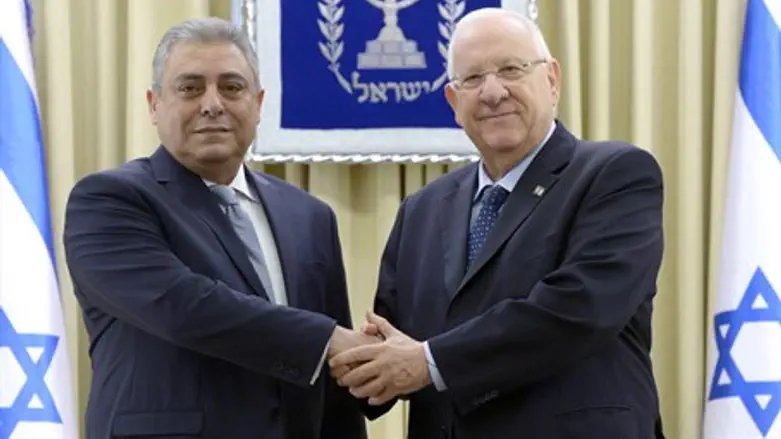
President Reuven Rivlin accepted on Thursday the credentials of Egypt's new Ambassador, Hazem Ahdy Khairat, marking the end of a more than three-year period without any Egyptian Ambassador to Israel.
The previous Ambassador, Atef Mohammed Salem Sayed Al-Ahl, was withdrawn in 2012 by then-President Mohammed Morsi, during Israel's Operation Pillar of Defense in Gaza.
The return of an Egyptian ambassador was warmly received when it was announced in July 2015, and both Rivlin and Khairat had warm words - though the traditional toast to the new ambassador was held behind closed doors at Cairo's request.
"I welcome here at the President's house ambassadors from around the world. But it is very special to welcome ambassadors from our close and important neighbors," Rivlin said.
Quoting an Arabic saying, the president added: "Egypt is 'Um El Donya', 'mother of the world,' and especially in our region Egypt plays a most important role.
"We live together in a difficult region. We have found a way to live together in peace and friendship. This is a message to the whole region, and the whole world.
"I was in Egypt during times of war, and I was in Egypt during peace. The peace agreement between our countries is an international treaty and it is for both us, a top priority. We may not agree on everything, but we respect each other and because of this we will build a shared future."
Ambassador Khairat responded by thanking the President and expressing his hope that renewed fully diplomatic relations with Israel would bring wider regional stability and prosperity.
"We must take responsibility for the benefit of those who live in this region, to bring prosperity, justice, hope and equality," he said.
Before departing, the Ambassador signed the official guestbook in Arabic:
"I presented today my letter of credence to his honor President Rivlin. We spoke in a constructive atmosphere regarding the urgent matters and agreed to work together to reach a comprehensive, and just peace in the region."
Relations between Jerusalem and Cairo have strengthened considerably under the presidency of Abdel Fatah al-Sisi, who has found common cause with Israel in fighting Islamist terrorism, particularly in the Sinai Peninsula and Gaza, and as Sunni Arab states look for a united front against an ascendant Iran.